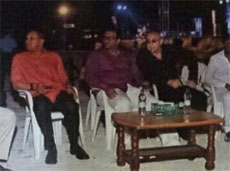The World Travel Awards event held at Paradise Island on Sunday night was a resounding success for tourism in Maldives.
Out of a possible 57 awards in the Indian Ocean category, the Maldives won 35 including the ‘Leading Destination’ title. All the wins listed on the worldtravelawards.com site seem to solidify Maldives’ position as the leading travel destination in the region.
In fact, this success certainly disproves the theory that the tourism industry has taken a hit from the February 2012 transfer of power.
So how does the pageant touted by some as the Oscars of the travel and tourism industry stack up against the likes of British Guild of Travel Writers’ (BGTW) Tourism Awards or the Michelin Green Guide?
The obvious difference between World Travel Awards and most of its competition is the former’s expansive list of categories and titles. The BGTW Tourism Awards has fewer categories in which thousands of potential businesses across the globe compete.
In contrast, businesses have a much better chance of taking a win from competing in the World Travel Awards. However, that maybe the only thing the World Travel Awards has going for it, because behind the veil of all the glitz and gala is a highly questionable business.
The first item of interest is the contact address given on the worldtravelawards.com website. The address ‘SE1 8SJ, London’ comes up as a stall in the visitor centre in London’s Waterloo Station.
For an awards show with 20 years of history, a stall in a visitor centre seems a little too modest. What is more surprising is that the address is home to another 33 companies under the same ownership as the World Travel Awards Limited, the company running the awards.
The World Travel Awards Limited is currently owned by a single shareholder, a Mr Graham Edward Cooke, who has listed Bayham Hall, Bayham Abbey in Kent as his address in the company’s articles of association. The company was originally registered with four shareholders holding a total of 200 shares worth a total value of GBP£200.
In the latest annual return filed by the company, the capital situation remained the same whilst Mr Graham Edward Cooke had become the sole owner. The company secretary is a Miss Manyoung Han.
Like the registered address of the company, Mr. Cooke and Miss Han also have highly quizzical places of residence. The website companiesintheuk.co.uk lists 101 other individuals and 24 other companies sharing the same address as Mr Cooke, and 46 individuals and 8 companies sharing Miss Han’s address. This clearly indicates that both addresses are for mail forwarding services.
As for the company’s address, 33 other companies sharing it suggests that it too may be another mail forwarding service. As for the 33 other companies owned by Mr Cooke, they have all posted little or no profits and have had dozens of dissolution notices served across the lot of them.
Why then did the Maldives Tourism Promotion Board enlist the services of this company given its questionable reputation?
Perhaps the lack of reputation is in itself an advantage. Since the company never declared a capital greater than GBP£200 throughout its existence it would not be difficult to incentivise the declaration of more wins for the Maldives. This leaves two questions to be answered.
Firstly, did the government of Maldives truly know that the company they were dealing with was really a shell corporation? If it did not, then did they really pay exorbitant sums to advertise on the awards website?
The second question is, if the government did know the nature of the company, why then were they given such broad coverage?
Could that not be interpreted as the country’s admission of the weakness of its tourism industry? Should it not be engaging a stronger partner like Michelin instead?
All comment pieces are the sole view of the author and do not reflect the editorial policy of Minivan News. If you would like to write an opinion piece, please send proposals to [email protected]


